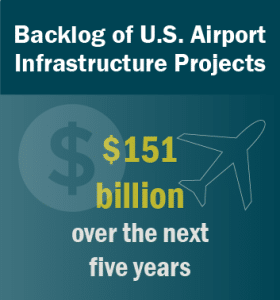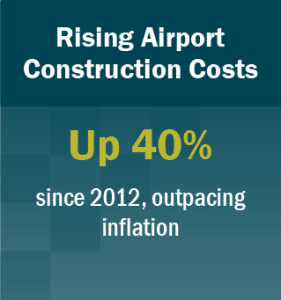Airport Program Managers Hold the Key to Capital Program Success
Multi-billion-dollar improvement projects are transforming airports across the United States.
These capital programs rarely limit their scope to a single terminal or roadway. Megaprojects encompass a wide range of interconnected upgrades to utilities, roadways, security protocols, airfield operations, and more.

Source: Airports Council International
Capital programs must comply with rigorous federal, state and authority-specific design standards. Strict safety, funding, and jurisdictional-specific requirements apply. Every step must be coordinated with the support of airlines and affected communities.
To address the growing scale and complexity of airport improvements, authorities are enlisting the services of specialized aviation program managers. Those who fill this important role must offer deep subject matter expertise, strong leadership and project-execution skills, and the ability to form productive relationships with a wide range of airport stakeholders.
Expectations of a Program Manager
The program manager provides specialized skills that the airport authority would otherwise have to fill by recruiting a full-time hire. The role cuts across planning, management and aviation engineering functions. Their scope may involve:
- Centralizing the coordination, integration and oversight functions all under one point of contact.
- Assisting in the development of program scope definition and key performance indicator metrics.
- Consulting authorities on procurement strategies, alternative financing options, and project-management structures, including review of third-party agreements.
- Providing cost-estimation services and guidance on budget-allocation strategies.
- Developing standardized design criteria, design-management procedures, and performance-monitoring protocols.
- Consulting authorities with regular progress updates, engaging stakeholders, and incorporating stakeholder input.
- Applying analytical tools to remediate budgeting or scheduling issues.
- Resolving technical design challenges through value-engineering and risk-management strategies.
- Engaging in field inspections to identify and address issues during construction, commissioning, or operational readiness activation and transition (ORAT).
The program manager needs big-picture perspective into a wide range of stakeholder requirements and airport operations.

Essential Soft Skills
A successful program manager must have the stamina and adaptability necessary to evaluate multiple opposing perspectives. With a strong program leader, airport authorities are better equipped to develop a successful plan for their capital improvements, and the collective team is more likely to navigate toward outcomes that align with the airport’s best interests.
Program managers must offer deep subject matter expertise and genuine credibility, Beyond those prerequisites, here are some additional hard and soft skills necessary for program managers to effectively perform the job.
Ability to Build Stakeholder Rapport
The program manager needs a big-picture perspective on a wide range of stakeholder requirements and airport operations. That level of insight can only be acquired through collaborative relationships and detailed understanding of stakeholder goals, passions and struggles. In the process, the program manager is better positioned to manage expectations, align priorities, and — importantly — control costs.
Seasoned program managers will proactively find ways to maintain communication and keep projects on track.
Clear and Effective Communicator
Communication silos can result in major setbacks. As the single point-of-contact, program managers need to rapidly respond to situations and lead clear coordination among responsible parties. At times, program managers may need creative strategies to capture the attention of notoriously slow-to-respond stakeholders — such as utility companies. Seasoned program managers will proactively find ways to maintain communication and keep projects on track.
Deep Understanding of Business Objectives
Airport authorities are increasingly incorporating performance incentives or penalties into procurement strategies. These contracting methods can provide benefits if the authority — guided by a knowledgeable program manager — understands what design and construction contractors can realistically achieve given the project circumstances. When a program manager is engaged early in the procurement process, they can influence how contracts are structured. This sets the table for all parties to achieve their performance goals while maintaining necessary profit margins — a win-win outcome.
Gifted in the Art of Forging Consensus

Source: Airports Council International
Airport authorities often need to develop program-specific design standards. The program manager ensures standards are followed consistently and uniformly throughout design reviews or when processing change orders — all while enabling innovation in appropriate cases. Differences in opinion are inevitable. The program manager must be able to reach consensus without jeopardizing the authority’s responsibilities as stewards of public infrastructure or best interests of the traveling public.
Leading the Way Toward Program Success
A strong program manager demonstrates their value by delivering project outcomes on schedule and within budget.
When conflicts arise, the program manager must be able to leverage meaningful, productive, truly genuine stakeholder relationships. A massive change order is not the time for making introductions.
It takes perseverance. Working through a complex, multi-faceted solution requires focused commitment. As one problem is resolved, others are likely to pile up.
More than an extension of staff, the program manager serves as a valuable component of airport leadership. With the right mix of hard and soft skills, an effective program manager can be the key to delivering efficient, timely and cost-effective outcomes — for the owner, stakeholders, contractors, and the traveling public.


